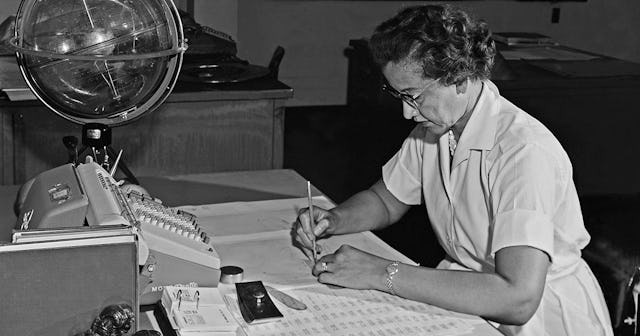The NASA Women Who Inspired 'Hidden Figures' Will Receive Congressional Gold Medals

Katherine Johnson, Dr. Christine Darden, Dorothy Vaughan, and Mary Jackson will each receive the highest civilian award in the U.S.
The four African American women who worked at NASA during the Space Race — the same four women who inspired the 2017 film Hidden Figures — will receive the highest civilian award in the U.S., the Congressional Gold Medal. Katherine Johnson, Dr. Christine Darden, Dorothy Vaughan, and Mary Jackson, as well as other African American women in NASA’s West Area Computing Unit, were integral to the success of the early space program and will each receive a gold medal.
The Hidden Figures Congressional Gold Medal Act was signed into law on Nov. 8 and co-sponsored by U.S. Senators Kamala Harris, Chris Coons, and Lisa Murkowski, along with U.S. Representatives Eddie Bernice Johnson and Frank Lucas. According to the bill, Johnson will receive a gold medal to recognize her service to the U.S. as a mathematician, and Darden will receive a gold medal for her service as an aeronautical engineer. Vaughan and Jackson will each receive a gold medal posthumously; Vaughan passed away in 2008 and Jackson in 2005. And, one gold medal will be awarded in recognition of all women who served as computers, mathematicians, and engineers at the National Advisory Committee for Aeronautics and the National Aeronautics and Space Administration between the 1930s and the 1970s.
The lives and careers of Johnson, Vaughan, Jackson, and Darden were famously told via Margot Lee Shetterly’s 2016 biography titled Hidden Figures: The American Dream and the Untold Story of the Black Women Mathematicians Who Helped Win the Space Race. The book was then adapted into the film, Hidden Figures.
“The stories of these four women exemplify the experiences of hundreds of women who worked as computers, mathematicians, and engineers at NACA beginning in the 1930s and their handmade calculations played an integral role in aircraft testing during World War II, supersonic flight research, sending the Voyager probes to explore the solar system, and the United States landing the first man on the lunar surface,” the bill states.
Harris, one of the people who introduced the bipartisan bill, said in a press release that Johnson, Vaughan, Jackson, and Darden made “monumental contributions to science and our nation.”
“The groundbreaking accomplishments of these four women, and all of the women who contributed to the success of NASA, helped us win the space race but remained in the dark far too long. I am proud our bill to honor these remarkable women has passed Congress. These pioneers remain a beacon for Black women across the country, both young and old,” Harris said.
The Girl Scouts also spoke out in support of the newly signed bill, saying the organization is “proud to stand with Congress” in honoring the four women.
“These four amazing women inspired generations of girls and women to pursue our interests in the STEM fields. As an engineer, scientist, and former member of NASA’s Jet Propulsion Laboratory, I am a direct beneficiary of these groundbreaking, courageous women, who blazed a trail for us all,” said Sylvia Acevedo, CEO of Girl Scouts of the USA. “Their impact on NASA, and their place in the pantheon of American scientific history, was hidden for too long. Today, we are excited that they are finally receiving the recognition they deserve.”
You can read all 16 statements of support from organizations like the American Institute of Aeronautics and Astronautics, the Association for Women in Science, the Society of Women Engineers, and more on Harris’ website.